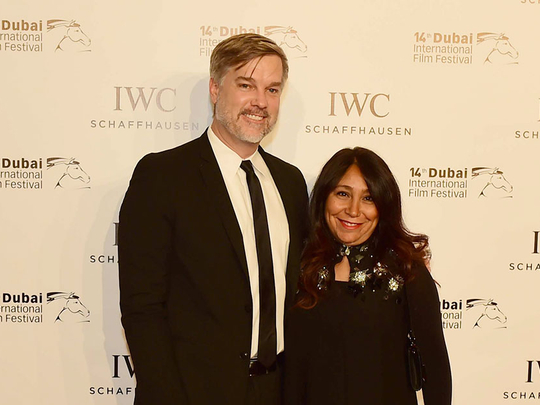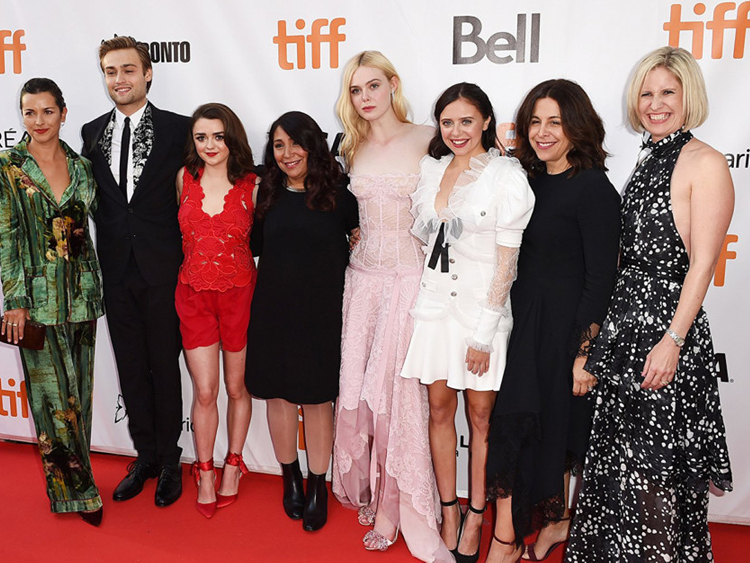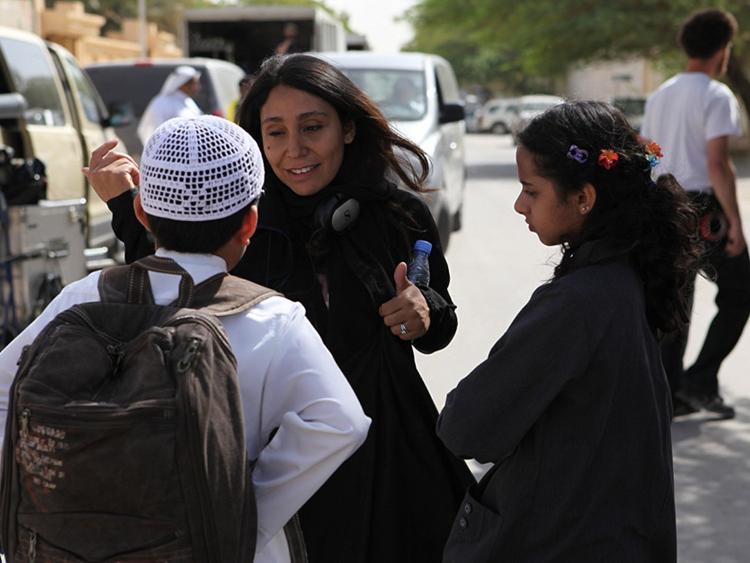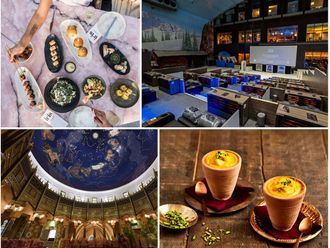
Netflix has become a rite of passage for ambitious directors, and Haifa Al Mansour is not one to be left out. The trailblazing visionary is gearing up for the 2018 release of her Netflix original film, Nappily Ever After, with actress Sanaa Lathan in the lead.
If you haven’t caught wind of Al Mansour yet, she’s the first female filmmaker out of Saudi Arabia. But that descriptor has begun to ring reductive as she continues to set the bar higher in the region.
Back in 2014, Al Mansour’s film Wadjda, about an 11-year-old girl growing up in Riyadh’s suburbs, became the first movie to be submitted by Saudi Arabia for the Best Language Film category at the Academy Awards. On Monday, Saudi Arabia lifted a 35-year ban on movie theatres — meaning in the future, films like Wadjda may even get a local cinematic release.
Al Mansour built on her wins on Thursday by nabbing the $100,000 IWC Filmmaker Award in Dubai for her upcoming animation Miss Camel, about a young girl who goes on an adventure with her animal friend.
And now, she’s back with her first Hollywood-starrer, Mary Shelley, a biographical drama about the whirlwind love affair which led to the writing of Frankenstein. The movie screened at the 14th Dubai International Film Festival, and stars Elle Fanning, Maisie Williams and Douglas Booth.
Al Mansour tells Gulf News tabloid! how it came to be — and what she thinks of the future of Saudi cinema.
You’re fresh off of showing Mary Shelley at Diff. How did that project come about?
Mary Shelley’s life and accomplishments are incredibly inspirational, and the constraints of her world are so similar to the ones I faced as a woman coming of age in Saudi. I was really impressed by the unique way she approached feminism, like her mother Mary Wollstonecraft, in that they were not afraid to be both feminine and revolutionary. They lived as rebels, but were also very feminine in their love lives, and not afraid to be soft or romantic at times — just be themselves and do what they wanted!
Did you have any reservations about creating an English-language movie?
The producers sent me the script and I have to admit, I was sceptical at first. I thought her story would feel very foreign to me, as the period and the setting were so far from what I felt comfortable with. But when I read Mary Shelley’s story, I felt an instant connection with it. She grew up in this very conservative culture, where women’s roles were much more rigid and opportunities were extremely limited. But she rose above it, and wrote a story that continues to capture the imagination of readers to this day.
Your upcoming project is a Netflix production, Nappily Ever After. What can people expect?
Nappily Ever After is a story about a woman learning to accept herself for who she is. It is about breaking away from the images that society place on women, with their hair or skin colour or body type, and learning to embrace our true selves. It is also funny, and a strong social commentary.
How did you become involved with the project?
I loved the script when I read it. I was also really looking forward to working with a seasoned actress like Sanaa Latham. She is just exceptional. It was such a joy to direct her in this film and I am so proud of the way it is coming together.
Netflix seems to be the new frontier of cinematic storytelling. Is that something you were eager to be a part of?
I’ve had an incredibly positive experience with Netflix and am so excited to be developing this project with them. They are very supportive, filmmaker focused, and seem genuinely interested in promoting diversity. I think they are redefining the possibilities for visual storytellers and I am thrilled to be a part of those efforts.
There naturally tends to be pressure when someone is a pioneer. Do you feel that as the first female director to come out of Saudi Arabia?
The main pressure I feel is to be true to myself and to continue making movies that represent my values. I am less concerned about being a pioneer and more concerned about laying the groundwork for future filmmakers from my country. My main motivation in making Wadjda was to make an inspiring film that was not about how women in Saudi Arabia are victims as much as how they can be leaders of change.
Wadjda was the first film to be submitted by Saudi to the Oscars. Recently, Baraka Meets Baraka became the second. Where do you think the Saudi filmmaking scene is heading now?
Saudi cinema is going to grow exponentially in the coming years. It is such a ripe environment for drama, and there are so many untold stories yet to be told. The interplay between tradition and modernity creates just the right amount of tension for great stories.
There’s a fantasy angle to your upcoming animation, Miss Camel: Hayla finds out she can speak to animals. What’s the significance of this?
She lives a life totally covered and isolated from the real world. When she ventures out of her family’s apartment, either to school or the mall, she veils herself completely. She is never seen, and exists in a strange, ghostlike obscurity that allows her to observe everything, but take part in nothing. Maybe it is this desire to be a part of the world that allows her to connect with this camel’s world, or maybe it is this desperate isolation that drives her crazy enough to believe she can talk to animals.
There’s been a large and ongoing discussion about diversity and inclusion of different voices in Hollywood. Is there a lot of work to be done still?
Of course there is still work to be done, but I am very optimistic and impressed with all of the efforts within the industry to foster positive change. Women are ruling the box office these days, both in front of the camera and behind it, so economic forces are playing a significant role in creating opportunities. There is also a real desire to hear from new voices and reach new audiences, so there are lots of reasons to be encouraged.
Finally, what does a day off for Haifaa Al Mansour look like?
I love spending time with my family and doing things with my two young children. There is always work to be done, but it is nice to have a family to go home to.















